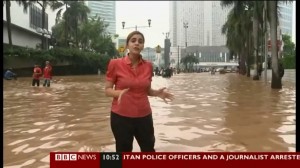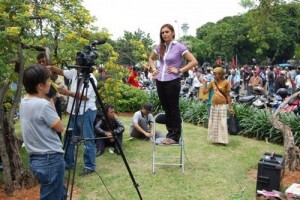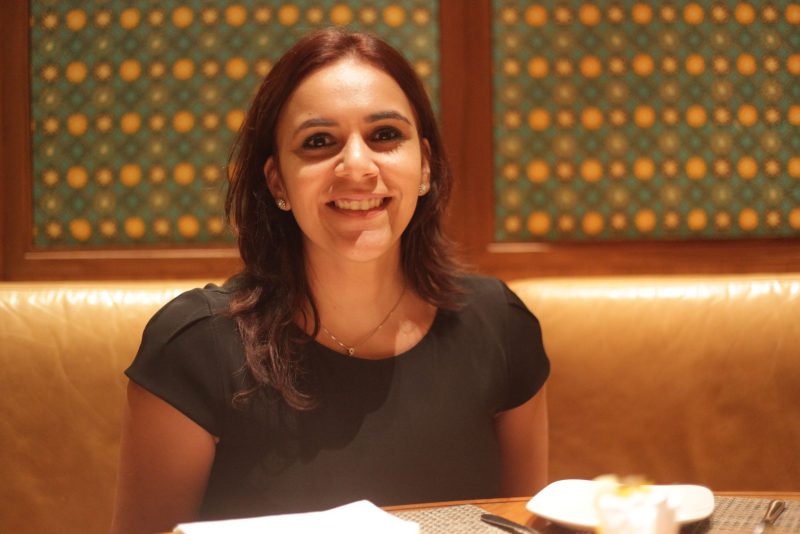Meet Karishma Vaswani, a well-known face in journalism. Karishma has been the BBC News Indonesia Correspondent since 2009, and was recently promoted to Indonesia Editor of BBC News. An intelligent and strong woman, Karishma is also a mother of two. She meets Indonesia Expat to discuss her experiences as a journalist and her views on unbiased reporting.
Karishma, where are you originally from and what brought you to Indonesia in 2009?
I moved here from India in 2009 with the BBC, but I lived here before as a child and my parents have been in Indonesia for a long time. Before moving here in 2009 I was working in Mumbai as the India Business Report Presenter. I went to primary school and high school in Jakarta, and I read English and American Literature at Warwick University in the UK. I have a Singaporean passport.
How do you juggle being the Indonesia Editor of BBC News and being a mother of two?
Well, family really helps. My mum and dad live here in Indonesia, so when I’m at work, they help me out a lot. My husband runs his own business in digital marketing, so he’s between Singapore and Jakarta. It was quite a struggle initially to think how I was going to look after the kids and work. The other day I was dropping my daughter at school and she said to me, “Mum, today I’m the boss. I’m going to ask the questions.” And I said, “OK great!” That’s exactly what I want her to be doing. I was the first girl in my family to go and get a job and it’s really encouraging that my daughter feels it’s possible to do all this. Juggling work and family is not always perfect, but it’s possible.
You’ve interviewed the Vice President of Indonesia, Jusuf Kalla, the founding father of Singapore, Lee Kwan Yew, the Indian Finance Minister, P. Chidambaram, Indonesia’s Trade Minister Gita Wirjawan, and the head of Indonesia’s investment board, Chatib Basri, along with many others. Which interview would you say was most memorable to you and why?
In Indonesia, I would have to say it wasn’t one person in particular; it was a group of people. Right before I went on maternity leave last year, the BBC ran a series of stories on asylum seekers. It was that group of asylum seekers that left a big impression on me. There was one chap in particular, who had spent about 30 days in a detention centre in Jakarta and was desperate to get to Australia but his boat was shipwrecked. Australia doesn’t want to take these guys and they don’t want to go back to their home country, Afghanistan, where they will be prosecuted. He was such a nice person who had left his home to try and find protection for his family.
He texted me a couple of weeks after the story went out and told me he was still in the detention centre and had no idea when he’d be getting out. I texted him when I returned from maternity leave and he never responded, so I’m kind of hoping he’s out and has found asylum, but there’s no way of telling. I think it’s those kinds of people who stay in your memory.
It’s a reflection of the fact that at the BBC is not about the high profile, ultra important politicians; we make it a point to go and speak to real people. So you’ll find in all of our stories that it’s the people on the ground that we really want to tell stories about. And that’s why it’s so important to recognize that we have the largest number of journalists of any news network in the world. We have people in the most inconceivable places, bringing invaluable perspective.
Have you interviewed Prabowo and Joko Widodo, the presidential candidates?
We interviewed Jokowi, but Prabowo wasn’t available, so we got his campaign spokesman Sandi Uno instead. Both sides were confident that they would emerge victorious. It’s a tight race, but what struck me throughout this election season is how politically engaged Indonesians are. No matter what happens, hopefully the real winner in all of this is Indonesian democracy. People should expect and demand more of their leaders.
Have you ever been in a dangerous situation here while doing your job?
In 2009, I was on the scene for the JW Marriott bombing. By the time I got to the scene, the bomb had already exploded. It was in the morning and I was at the gym when I got the call, so I went straight out. There were people everywhere, and I had just come away from reporting on the siege in Bombay, so I kept transferring my previous experience over, thinking, “Are there going to be armed gunmen?”
What does the BBC do to protect its journalists?
We have a hostile environment course, which we all have to undergo, with constant refreshers. Nothing can prepare you for a dangerous situation, but we try and equip our journalists with tips for how to cross a checkpoint, how to identify whether the sound of a bomb is one that’s very far away or if you should dive to the ground. Or at a dodgy checkpoint, do you sense that the guys are just going to ask you for cigarettes or are they going to abduct you? There’s a lot of roll play, which can be quite scary. A colleague of ours, Alan Johnston was kidnapped and he was on one of our courses. After he was released, as a result of a lot of lobbying, he talked about what kept him going and it was the things he had learned; Stockholm syndrome, how to talk to people who kidnapped you, etc. First aid is also the most important aspect of this course.
What do you believe the future has in store for Indonesia?
Indonesia has seen remarkable growth over the last decade, but it has to remain on a stable path, with stable governance and a stable environment.
Do you see Indonesia as home?
Yes, definitely. I have no plans to leave. My parents live here and it’s really nice for them to have their grandkids around. And it’s exciting for a reporter – there’s so much going on here!
Tell us about the BBC’s impartial ethics, which must be followed by its journalists.
Everyone accepts that journalists have personal biases; that’s a fact of life. But the responsibility of the journalist, and certainly the expectation of the BBC, is that if that personal bias leaks in, you are not doing your job. If you were on my team and you came to me and said, “I have an issue covering this story because I feel so strongly about this,” then I would say, “I think you need to excuse yourself from this story because you can’t get beyond your personal limitations.” And that’s fine. Sometimes people feel really strongly about things and they need to be honest with themselves. That’s part of journalism as well; honesty and integrity. To have a personal bias, that bias cannot affect itself into your work. If you feel that unbiased reporting doesn’t really exist here, then I would ask you to consume more BBC material.




